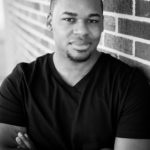
I wrote this scene to “Went Home to Meet Conrad” on Mellotron Variations. The caprices of the bell-like sounds, the eerie droning, made me think of being in the twilight zone; this in turn reminded me of being the sole Black person in white spaces.
This scene will be part of a longer work, and is situated in the protagonist’s year-long return to work at his alma mater, Bethsaida Christian University.
Inspired by Mellotron Variations
Inspired by Mellotron Variations
Behn rose with the others, but tarried a few beats before moving towards the isle. The wide white stage was empty. The principal Actor in this evangelical myth now descended, shaking hands with his co-conspirators. The white hands joined with familiar power: remember the task! Remember the task!
Behn watched them, the venerated figures of a small republic, receive their power. But he knew that the Actor would never traverse in his direction. That somehow, he was folded into the task; he felt them, aware of his presence—but he rarely saw their eyes. Finally, he stepped out into the isle, away from the engineered light of the stage and towards the truer brilliance that beckoned to him from outside.
“Glad our enrollment’s up. Looks like we’ll get our two percent increase this year, after all.”
In her voice, he heard summer nights of Alabama—familial laughter, smoke of onions and meat. She, the registrar, walked some steps before him. Behn could not see her face, but remembered the great kindness that settled in the corners of her gushing blue eyes, the deep pockets of joy that bordered generous lips. Go ahead and register for classes. We’ll find the money. And the shoulders of the needy Black students fell in relief.
“He pulled it off. Lord knows we couldn’t’ve tightened this belt any further.”
She continued her encomiums, as she passed over into the waiting sunshine. For a moment, the curves of her body filled the doorway. Thick shoulders. Corseted waist. Bold legs. Gay sundress. This body had seen time, knew corporally the edge, and how close to it the Empire had been. This body held in its hills and plains, secrets of pecuniary embarrassment. As she crossed over, Behn wanted to think loving thoughts towards her. But he knew that when the fire and the fury came, she too would be swept up by angry, licking flames.
“Come on, folks! We’re closing up shop.”
Behn swung his head around to the speaker, who stood down near the stage. He was one of the Actor’s men. A young, brown-haired Ohioan. Corn-fed. Mountaneous pectorals stretched beneath his blue oxford. A red and white striped tie delineated the two regions on his chest. Behn’s gaze rose from the mystique of the hanging fruit between the man’s legs—the great havoc such a small thing could wreak!—rose to meet a cold, hard, long stare. Behn was transfixed to the spot.
The question then remained: what did the man see when he looked in Behn’s direction? It is quite possible that he saw disruption, a departure from the age-old pattern. It was his inherited duty, then, to correct such defects before they became one with the Empire. Whatever he saw, he did not see Behn. As in the Markan text, this could not be possible without Christ and Christ’s spittle. For only Christ himself could spit into this man of Bethsaida’s eyes that he might see. And even then, Christ would have to tarry with him, for he might only see men as trees. His white brother, Jesus, would have to ask him: why is it that you see men as trees—to cut down, to pulp, to transplant, to piss on, to shit by, to campaign for and save? And Jesus’ own life would be in grave danger, in the presence of such impairments.
Behn shuddered at the thought, and stepped into the light from the doorway. He glanced back at the man, who had returned to clearing the hall. His biceps, pressing against the second skin of his shirt, threatened to move the unmovable, and harry the shiftless. In the twinkling of an eye, the man looked Behn’s way, noting his abiding presence. A light smile pulled across his lips. It was with remarkable dexterity that those of his ilk moved between faces.
In a way, Behn was envious. Not of their ability to be desperately ugly. Rather, Behn was taken with the manner in which they could reveal the existence of a dark mind, and then cause him to question whether or not he had dreamed the entire thing.


